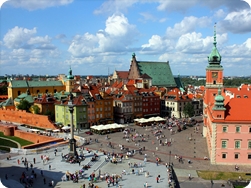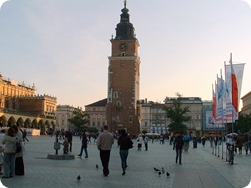Poland has pursued a policy of economic recovery since 1990 and now stands out as a success story among the former communist economies. Before 2009, GDP growth was about 5% annually, based on rising private consumption, a rise in corporate investment, and funds from the EU. GDP per capita is still below the EU average, but is similar to other Baltic states. Since 2004, EU membership and access to the EU funds have provided a major boost to trade and the economy. Unemployment fell to 6.4% in October 2008 but has since climbed back to 8.9% by January 2010, but still remains below the EU average. In 2008 inflation reached 4.3%, greater than the upper limit of the National Bank of Poland's target, but has since fallen to 3.5% by January 2010 partly due to the global economic slowdown.
Poland's economic performance should improve over the medium to longer term providing the country addresses deficiencies in its transport, road and rail infrastructure and associated business environments. Other areas of concern are: an inefficient commercial court system, a rigid labour code, too much bureaucratic red tape, a heavy burdensome tax system, and the ever persistent low-level corruption which keeps the private sector from performing to its full potential.
With increasing demands on central funds to fund health care, education, and the state pension system Poland faces a challenge to hold the public sector budget deficit to under 3.0% of GDP, a target which was achieved in the period 2007-09. The PO/PSL coalition government, which came to power in November 2007, would like to reduce the budget deficit in 2010 and has also announced its intention to press ahead with business-friendly reforms, its aims are to increase the workforce participation, reduce the growth in public sector spending, decrease taxes, and accelerate the growth in privatization, at a time when the rest of Europe is in deep financial problems.
In reality the government has moved little on major reforms and meanwhile the legislature has passed a law significantly limiting early retirement benefits. A Health care reform bill also passed through the legislature, but then failed to overturn a presidential veto.
David's Travel Guides




